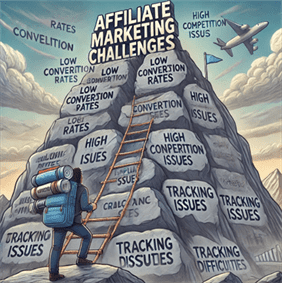Navigating the Challenges of Affiliate Marketing: A Comprehensive Guide for Success
Struggling with affiliate marketing? Our guide tackles the challenges of affiliate marketing head-on, providing actionable solutions for success.
Introduction: The Affiliate Marketing Landscape
In the ever-evolving world of digital marketing, affiliate marketing stands out as a powerful strategy for businesses and individuals alike. But as with any lucrative opportunity, it comes with its fair share of hurdles. Whether you’re a seasoned pro or just dipping your toes into the affiliate marketing waters, understanding and overcoming these challenges is crucial for your success.
In this comprehensive guide, we’ll dive deep into the challenges of affiliate marketing and equip you with the knowledge and strategies to conquer them. From fierce competition to the intricacies of building trust with your audience, we’ll cover it all. So, buckle up and get ready to transform these obstacles into stepping stones on your path to affiliate marketing mastery!
Understanding Affiliate Marketing: A Brief Overview
Before we delve into the challenges, let’s quickly recap what affiliate marketing is all about.
Affiliate marketing is a performance-based marketing strategy where businesses reward affiliates for each customer or visitor brought in through the affiliate’s own marketing efforts. As an affiliate marketer, you promote products or services through your unique affiliate link, and when a sale or specified action occurs, you earn a commission.
It’s a win-win situation: businesses expand their reach, and affiliates earn money by leveraging their influence and marketing skills. However, this seemingly simple concept comes with its own set of complexities and challenges.
The Top Challenges of Affiliate Marketing and How to Overcome Them

1. Finding the Right Niche and Products
Challenge: One of the first hurdles you’ll face is identifying a profitable niche and selecting the right products to promote. With countless options available, it’s easy to feel overwhelmed or make the mistake of choosing a saturated market.
Solution:
- Conduct thorough market research to identify trending and evergreen niches.
- Analyze competition and search for gaps in the market.
- Choose products you’re passionate about or have personal experience with.
- Use tools like Google Trends, Amazon Best Sellers, and affiliate networks to gauge product popularity.
- Consider the commission structure and conversion rates of potential products.
2. Standing Out in a Competitive Landscape
Challenge: The affiliate marketing space is crowded, making it difficult to differentiate yourself from other affiliates promoting similar products.
Solution:
- Develop a unique brand voice and personality.
- Create high-quality, original content that adds value to your audience.
- Focus on building expertise in your chosen niche.
- Leverage multiple marketing channels (e.g., blog, social media, email marketing) to reach your audience.
- Offer exclusive bonuses or resources to incentivize purchases through your affiliate links.
3. Building and Engaging an Audience
Challenge: Success in affiliate marketing hinges on having a loyal and engaged audience. Building this audience from scratch can be time-consuming and challenging.
Solution:
- Consistently create valuable, relevant content for your target audience.
- Engage with your audience through comments, social media, and email.
- Use SEO strategies to increase organic traffic to your website or blog.
- Collaborate with other content creators in your niche for cross-promotion.
- Leverage the power of email marketing to nurture relationships with your audience.
4. Maintaining Trust and Authenticity
Challenge: As an affiliate marketer, your success depends on the trust your audience places in you. Promoting products solely for the commission can erode this trust quickly.
Solution:
- Only promote products you genuinely believe in and have personally used when possible.
- Be transparent about your affiliate relationships.
- Provide honest, balanced reviews that highlight both pros and cons.
- Focus on how the product solves your audience’s problems rather than just its features.
- Regularly engage with your audience to understand their needs and preferences.
5. Tracking and Optimizing Performance
Challenge: Without proper tracking and analysis, it’s difficult to know which strategies are working and which need improvement.
Solution:
- Implement reliable tracking tools to monitor clicks, conversions, and commissions.
- Regularly analyze your data to identify top-performing content and products.
- A/B test different elements like call-to-actions, landing pages, and email subject lines.
- Use link cloaking to create clean, branded links that are easier to track and manage.
- Stay updated on the analytics provided by your affiliate networks and adjust your strategies accordingly.
6. Dealing with Technical Issues
Challenge: From setting up a website to implementing tracking codes, technical aspects can be daunting for many affiliate marketers.
Solution:
- Invest time in learning basic web development and SEO skills.
- Use user-friendly platforms like WordPress for your website.
- Leverage plugins and tools designed for affiliate marketers.
- Don’t hesitate to seek help from online communities or hire professionals for complex technical issues.
- Regularly update your website and tools to ensure smooth functionality.
7. Adapting to Algorithm Changes
Challenge: Search engine and social media algorithms are constantly evolving, which can impact your traffic and visibility.
Solution:
- Stay informed about algorithm updates and industry news.
- Diversify your traffic sources to reduce dependence on a single platform.
- Focus on creating high-quality, valuable content that stands the test of time.
- Adapt your SEO strategies to align with current best practices.
- Build a strong email list as a reliable traffic source that you control.
8. Managing Multiple Affiliate Programs
Challenge: As you grow, you may find yourself juggling multiple affiliate programs, each with its own rules, payouts, and tracking systems.
Solution:
- Use affiliate management tools to streamline your operations.
- Create a system for organizing your affiliate links and promotional materials.
- Regularly review the performance of each program and focus on the most profitable ones.
- Stay compliant with the terms and conditions of each program.
- Consider using a spreadsheet or dedicated software to track your earnings across different programs.
9. Dealing with Commission Structures and Payment Issues
Challenge: Varying commission rates, payment thresholds, and delayed payments can create cash flow issues for affiliate marketers.
Solution:
- Prioritize programs with favorable commission structures and reliable payment histories.
- Diversify your income streams to ensure a steady cash flow.
- Keep accurate records of your earnings and expected payments.
- Understand the payment terms of each affiliate program you join.
- Consider using services like PayPal or Payoneer to streamline international payments.
10. Staying Compliant with Regulations
Challenge: Navigating the legal landscape of affiliate marketing, including disclosure requirements and data protection regulations, can be complex.
Solution:
- Familiarize yourself with FTC guidelines and other relevant regulations in your region.
- Always disclose your affiliate relationships clearly and prominently.
- Stay updated on data protection laws like GDPR and ensure your practices are compliant.
- Consider consulting with a legal professional to ensure full compliance.
- Use affiliate disclosure plugins or templates to make compliance easier.

Advanced Strategies for Overcoming Affiliate Marketing Challenges
As you progress in your affiliate marketing journey, you’ll encounter more sophisticated challenges. Here are some advanced strategies to help you tackle them:
1. Leveraging Data Analytics for Personalization
Challenge: Generic marketing approaches often fall flat in today’s personalized digital landscape.
Solution:
- Implement advanced analytics tools to gather detailed insights about your audience.
- Use this data to create personalized content and product recommendations.
- Segment your email list for targeted campaigns.
- Utilize retargeting strategies to re-engage potential customers.
2. Embracing Multi-Channel Marketing
Challenge: Relying on a single marketing channel limits your reach and increases vulnerability to platform changes.
Solution:
- Develop a presence across multiple platforms (e.g., blog, YouTube, Instagram, Pinterest).
- Tailor your content and approach to suit each platform’s unique audience and features.
- Use tools like Buffer or Hootsuite to manage multiple social media accounts efficiently.
- Create a cohesive brand experience across all channels.
3. Innovating with Content Formats
Challenge: Standing out in a sea of content requires creativity and innovation.
Solution:
- Experiment with various content formats like video, podcasts, infographics, and interactive content.
- Use storytelling techniques to make your content more engaging and memorable.
- Create comprehensive, evergreen resources like ultimate guides or video series.
- Repurpose your best-performing content into different formats to maximize its reach.
4. Building Strategic Partnerships
Challenge: Growing your affiliate business solo can be limiting and slow.
Solution:
- Collaborate with other affiliates or influencers in complementary niches.
- Participate in or organize virtual summits or webinars.
- Guest post on high-authority sites in your niche to expand your reach.
- Consider creating a mastermind group with other serious affiliate marketers.
5. Implementing Conversion Rate Optimization (CRO)
Challenge: Driving traffic is only half the battle; converting that traffic is crucial for success.
Solution:
- Conduct regular A/B tests on your landing pages, email campaigns, and call-to-actions.
- Use heat mapping tools to understand how visitors interact with your site.
- Optimize your site’s loading speed and mobile responsiveness.
- Implement exit-intent popups and smart CTAs to capture more leads.
The Future of Affiliate Marketing: Trends and Predictions
As we navigate the challenges of affiliate marketing, it’s crucial to keep an eye on the horizon. Here are some trends and predictions that could shape the future of affiliate marketing:
- Increased Focus on Influencer Partnerships: Brands are likely to seek deeper, more authentic partnerships with influencers who have engaged niche audiences.
- Rise of Voice Search Optimization: With the growing popularity of voice-activated devices, optimizing content for voice search will become increasingly important.
- Emphasis on Video Content: Video marketing, including live streaming and short-form content, is expected to dominate affiliate marketing strategies.
- Integration of Artificial Intelligence: AI will play a bigger role in personalization, predictive analytics, and automating various aspects of affiliate marketing.
- Growth of Mobile Affiliate Marketing: With mobile usage continuing to rise, optimizing for mobile experiences will be crucial for success.
- Increased Transparency and Authenticity: Consumers will demand more transparency from affiliates, making authentic, value-driven marketing more important than ever.
- Expansion into Emerging Markets: As internet penetration increases globally, new markets will open up for affiliate marketers.
By staying ahead of these trends, you can position yourself to overcome future challenges and capitalize on new opportunities in the affiliate marketing landscape.
Key Takeaways: Mastering the Challenges of Affiliate Marketing
As we wrap up our comprehensive guide to the challenges of affiliate marketing, let’s recap the key points to remember:
- Choose Your Niche Wisely: Success starts with selecting the right niche and products that align with your passion and audience needs.
- Differentiate Yourself: Stand out in a competitive market by developing a unique brand voice and creating high-quality, original content.
- Build a Loyal Audience: Focus on consistently delivering value and engaging with your audience across multiple channels.
- Maintain Trust and Authenticity: Only promote products you believe in and always be transparent about your affiliate relationships.
- Track and Optimize Performance: Use analytics tools to monitor your progress and continually refine your strategies.
- Stay Technically Savvy: Invest time in learning basic technical skills and leverage tools designed for affiliate marketers.
- Adapt to Changes: Stay informed about industry trends and algorithm updates, and be ready to adjust your approach accordingly.
- Manage Multiple Programs Efficiently: Use organizational tools to streamline your operations across different affiliate programs.
- Understand Commission Structures: Prioritize programs with favorable terms and diversify your income streams.
- Ensure Compliance: Stay up-to-date with regulations and always disclose your affiliate relationships.
- Embrace Innovation: Experiment with new content formats and marketing channels to stay ahead of the curve.
- Build Strategic Partnerships: Collaborate with other marketers and influencers to expand your reach and learn from others.
Remember, overcoming the challenges of affiliate marketing is an ongoing process. Stay patient, persistent, and always be willing to learn and adapt. With the right mindset and strategies, you can turn these challenges into opportunities for growth and success in your affiliate marketing journey.

FAQ: Navigating the Challenges of Affiliate Marketing
- Q: How long does it take to start making money with affiliate marketing?
A: The time it takes to start earning from affiliate marketing varies greatly depending on factors like your niche, marketing efforts, and audience size. Some may see results within a few months, while for others it might take a year or more. Consistency and persistence are key. - Q: Is affiliate marketing still profitable in 2024?
A: Yes, affiliate marketing remains a profitable venture in 2024. While competition has increased, so have the opportunities. With the right strategy and niche selection, there’s still significant potential for earnings. - Q: How do I choose the right affiliate programs to join?
A: Look for programs that align with your niche and audience interests. Consider factors like commission rates, cookie duration, product quality, and the reputation of the company. It’s often better to start with a few high-quality programs rather than spreading yourself too thin. - Q: How can I increase my affiliate conversion rates?
A: To improve conversion rates, focus on creating valuable content that addresses your audience’s needs, use compelling calls-to-action, optimize your website for user experience, and only promote products you genuinely believe in. A/B testing different elements can also help identify what resonates best with your audience. - Q: Is it necessary to disclose affiliate relationships to my audience?
A: Yes, it’s not only ethical but also legally required in many jurisdictions to disclose your affiliate relationships. Transparency builds trust with your audience and helps you comply with regulations like the FTC guidelines. - Q: How can I deal with seasonal fluctuations in affiliate income?
A: Diversify your affiliate portfolio to include products with different seasonal peaks. Additionally, create evergreen content that performs well year-round, and consider promoting digital products or services that are less affected by seasonality. - Q: What are some common mistakes new affiliate marketers make?
A: Common mistakes include choosing an oversaturated niche, promoting too many products at once, neglecting to build an email list, focusing solely on making sales rather than providing value, and not tracking performance metrics. - Q: How important is SEO for affiliate marketing success?
A: SEO is crucial for long-term success in affiliate marketing. It helps you attract organic traffic, reduces reliance on paid advertising, and builds authority in your niche. Invest time in learning and implementing SEO best practices. - Q: Can I do affiliate marketing without a website?
A: While having a website is beneficial, it’s possible to do affiliate marketing without one. You can use social media platforms, YouTube, or email marketing. However, a website gives you more control and can be a valuable asset in building your brand and authority. - Q: How do I stay motivated when facing challenges in affiliate marketing?
A: Set realistic goals and celebrate small wins. Connect with other affiliate marketers for support and inspiration. Continuously educate yourself and remember that success often takes time. Focus on the progress you’re making rather than comparing yourself to others.
Related Posts:
- What is Affiliate Marketing? A Simple Explanation
- Fiverr Affiliate program (Unlock your Potential Earnings)
Further Reading:






